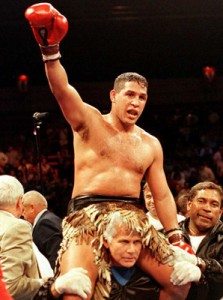Miguel Tellado
Presentamos a un contribuidor nuevo para Espresso con Leche– mi padre, Miguel Tellado, aficionado de deportes, en particular el boxeo. Le damos gracias por su aportación con tan poco aviso de mi parte.
Nota de la publicadora: Al momento en que se publicó este artículo, nos acabábamos de enterar de la muerte de Héctor Camacho, después de que sus médicos le declararon muerte cerebral en Centro Médico. De acuerdo a muchos reportajes, su familia ha autorizado la donación de sus órganos a otros en necesidad. Por lo menos estamos agradecidos de que en medio de esta tragedia, salga algo positivo. Enviamos nuestro más sentido pésame y nuestras oraciones a la familia de Camacho y sus seres queridos, y a la comunidad entera que hoy está de luto.
Hace varias horas, el ex-pugilista Héctor “El Macho” Camacho perdió una batalla entre la vida y la muerte, el resultado de un tiroteo trágico el martes en Bayamón, en su Puerto Rico nativo.
Conocido por su estilo ostentoso, dentro y fuera del cuadrilátero, el fue uno de los boxeadores más subestimados de su época. El se enfrentó a la mayoría de los grandes pugilistas contemporáneos entre los 1980 y los 1990, y dominó las categorías peso ligero (135 lbs.) y peso ligero menor (130 lbs.).
El Macho poseía habilidades pugilísticas excelentes a demás de ligereza, y era conocido por la delicadeza de su estilo como boxeador. Tenía la combinación perfecta de habilidades ofensivas y defensivas en el cuadrilátero.
Camacho fue un verdadero ejemplo del arte y la ciencia del boxeo. El peleó contra estrellas como Julio César Chávez y Edwin Rosario, y casi al final de su trayectoria, Oscar de la Hoya y Sugar Ray Leonard, estos últimos dos siendo mucho más grandes y fuera de su categoría de peso, y mucho después de su apogeo.
No obstante las circunstancias controversiales y aún no muy claras de su muerte– haya sido que Camacho estaba en el lugar incorrecto al momento incorrecto, o si efectivamente él era el objetivo del ataque– el sentimiento prevaleciente en la comunidad puertorriqueña es una de una pérdida muy profunda de un atleta talentoso, uno que contribuyó mucho al mundo de boxeo. El hecho de que Puerto Rico tiene un problema serio de violencia que va aumentando, es una realidad lamentable que no se puede negar.
Camacho dejó un legado extraordinario e inspiró a muchos boxeadores jóvenes famosos; muchos de ellos han expresado abiertamente su tristeza.
Un hombre que dedicó su carrera a un deporte que se presta para incurrir lesiones, murió mientras estaba sentado en un carro una noche.
Qué trágica ironía.
 “El Macho” en su apogeo como boxeador durante los 1980s. (Foto cortesía de Sports Illustrated.)
“El Macho” in his heyday as a boxer in the 1980s. (Photo courtesy of Sports Illustrated.)
“El Macho” en su apogeo como boxeador durante los 1980s. (Foto cortesía de Sports Illustrated.)
“El Macho” in his heyday as a boxer in the 1980s. (Photo courtesy of Sports Illustrated.)
It is my pleasure to introduce a new contributor to Espresso con Leche– my father, Miguel Tellado, a sports aficionado, and boxing fan in particular. I thank him for his contribution, especially since it was on such short notice on my part.
Publisher’s Note: At the time this piece was published, we had just learned of the passing of Héctor Camacho, after he was declared brain-dead by his physicians in Centro Médico. According to news reports, his family has authorized the donation of his organs to others in need. We are at least grateful that, in the wake of this tragedy, something positive can come out of it. We extend our condolences and prayers to Camacho’s family and loved ones, and to a grieving community.
A while ago, former boxer Héctor “El Macho” Camacho” lost a struggle between life and death, the result of a tragic shooting Tuesday in Bayamón, in his native Puerto Rico.
Known for his flashy style, in and out of the ring, Camacho was one of the most underrated boxers of his time. He fought most of the great fighters of his era in the 1980s and 1990s, and was dominant in the Jr. Lightweight (130 lbs.) and Lightweight divisions (135 lbs.).
El Macho possessed excellent boxing skills and footwork, and was known for the “finesse” of his boxing style. He had the perfect combination of offensive and defensive capabilities in the ring.
Camacho was a true example of the “art and science” of boxing. He fought boxing greats such as Julio César Chávez and Edwin Rosario, and, towards the end of his career, Oscar de la Hoya and Sugar Ray Leonard, these latter two being much bigger men outside of his weight class, when he was already well past his prime.
Notwithstanding the as-of-yet controversial and unclear circumstances of his death– whether it was Camacho being in the wrong place at the wrong time, or whether he really was an intended target in the shooting– the resounding sentiment in the Puerto Rican community is that of a deeply-felt loss of a very talented athlete, one who contributed much to the realm of boxing. That the tiny island of Puerto Rico has a serious problem of escalating violence is an undeniable and unfortunate reality.
Camacho left a remarkable legacy and inspired many famous young boxers of today, many of whom have been vocal about their grief.
A man who devoted his career to a sport that often incurs injuries died while sitting in a car one night.
That irony isn’t lost on us.
